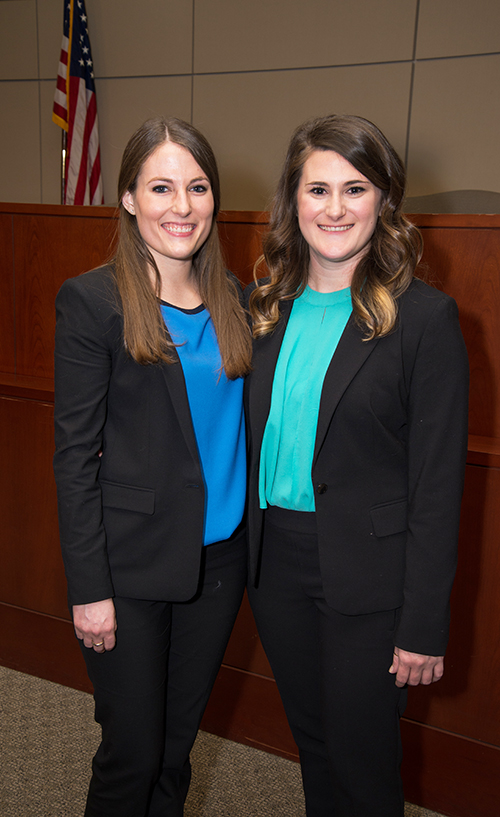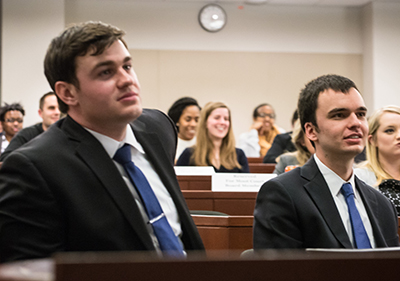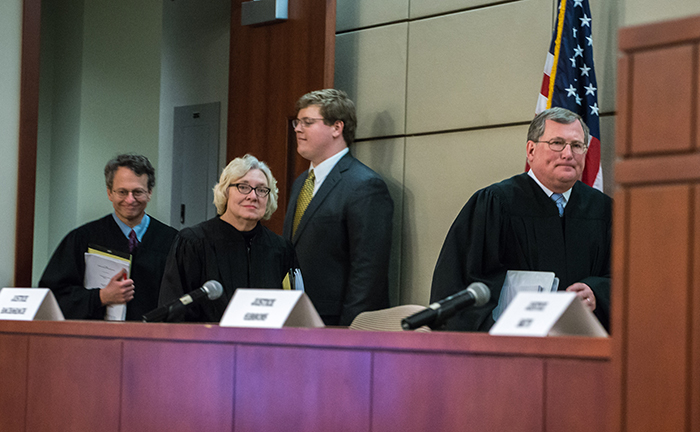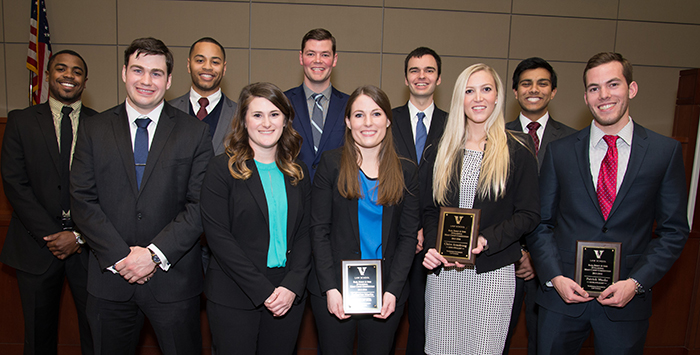 Katherine Martin ’17 and Bianca DiBella ’17 (pictured right) won Vanderbilt Law School’s 2015-16 Bass Berry & Sims Moot Court Competition, held Feb. 5, receiving the John A. Cortner Championship Award and a cash prize for their win.
Katherine Martin ’17 and Bianca DiBella ’17 (pictured right) won Vanderbilt Law School’s 2015-16 Bass Berry & Sims Moot Court Competition, held Feb. 5, receiving the John A. Cortner Championship Award and a cash prize for their win.
 DiBella and Martin faced finalists Kyle Lyons-Burke ’17 and Andrew Marino ’17 (pictured left). The competition began last fall with 68 teams of two students, for a total of 136 participants. Under the leadership of Vanderbilt Moot Court Board Chief Justice Sharmeen Ladhani ’16, Executive Justice Alex Vey ‘16 managed a team of third-year students who organized and ran the competition.
DiBella and Martin faced finalists Kyle Lyons-Burke ’17 and Andrew Marino ’17 (pictured left). The competition began last fall with 68 teams of two students, for a total of 136 participants. Under the leadership of Vanderbilt Moot Court Board Chief Justice Sharmeen Ladhani ’16, Executive Justice Alex Vey ‘16 managed a team of third-year students who organized and ran the competition.
The competition’s final round was argued before a panel of three federal appellate judges, including Judge Julia Smith Gibbons of the U.S. Court of Appeals for the Sixth Circuit, who served as the round’s Chief Justice, Judge D. Brooks Smith of the U.S. Court of Appeals for the Third Circuit, and Judge Robert Bacharach of the U.S. Court of Appeals for the Tenth Circuit. During their visit to Vanderbilt Law School, the three judges also offered advice for students seeking judicial clerkships in a lunch-hour panel moderated by Professor Michael Bressman.

The 2015-16 Moot Court problem, written by Executive Problem Editor Matt Gornick ’16 and Associate Problem Editors Ryan Kilpatrick ‘16 and Andrew Struckmeyer ‘16, focused on two discrete Fourth Amendment issues within the context of a criminal investigation. Respondent Frank Semyon was charged with possessing 1,100 kilograms of marijuana after the government discovered the plants at his home during a search for which its agents had secured a warrant.
However, in order to secure that warrant, the agents used information gleaned from two warrantless activities: their acquisition of Semyon’s cell phone location information and aerial surveillance of his home by a drone equipped with a “NarcoSniffer,” a mechanical version of a drug-sniffing dog. Semyon claimed that both of these actions violated his Fourth Amendment rights and moved that the evidence derived from these activities be suppressed. DiBella and Martin argued for the respondent, Frank Semyon, and Lyons-Burke and Marino argued for the petitioner, the United States.
Martin received the award for Best Oralist, and the team of Pratik Ghosh ’17 and Neil Greenwell ’17 received the award for Best Brief. Semi-finalists included 2017 class members C.J. Donald, Kamron Cox, Claire Armstrong and Patrick Weeks.
